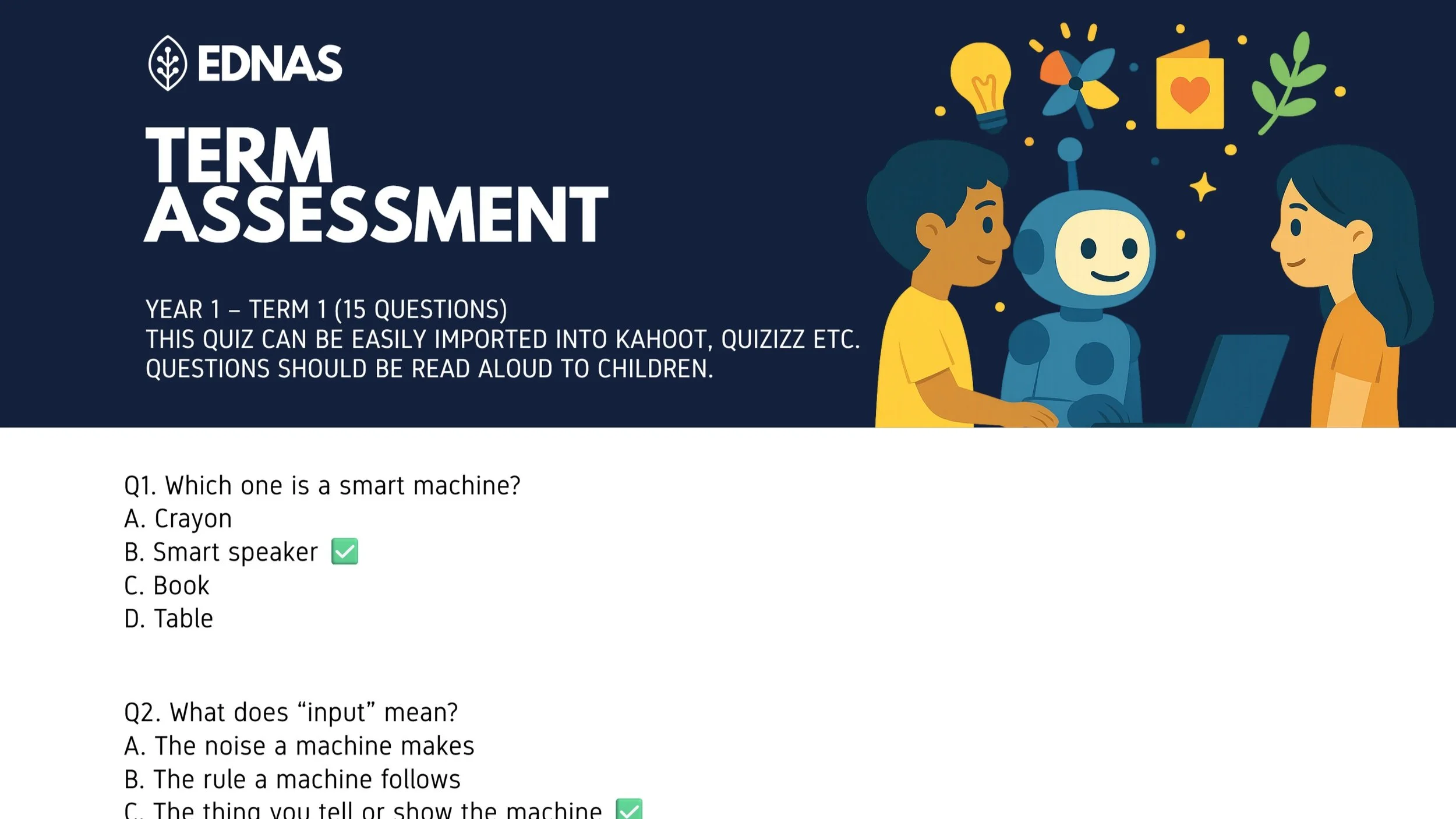AI is transforming the world.
will your students shape the future or be shaped by it?
An AI curriculum isn’t just about learning tools. It’s about developing critical thinkers, ethical decision-makers, and data-literate citizens. The schools that act now will equip their students to lead
Our AI curriculum, the first of its kind covering KS1 - KS3 (K-9), details the learning objectives, success criteria and projects your teachers need to ensure your learners are receiving the best AI education to thrive in an AI-driven world, not struggle to catch up.
Our ready-made resources combine project-based learning and real-world case studies to build the necessary skills and prepare you to deliver future-ready learning with confidence and clarity.
Enable your teachers with our comprehensive resources
Your teachers don’t need to be experts in AI, leave that to us!
EDNAS supports educators with comprehensive lesson plans enabling seamless integration into classrooms without requiring additional hardware.
We provide everything educators need to teach with confidence and deliver high-quality AI education with ease
ednas AI CURRICULUM
Our AI curriculum is designed to help schools deliver age-appropriate, engaging, and ethical AI education from early primary to secondary levels. Built around the EDNAS AI Framework, it guides teachers and students to explore how AI works, why it matters, and how to use it responsibly.
The curriculum empowers every learner to become confident, curious, and future-ready.
-
Our curriculum supports the core and innovative domains outlined in PISA 2029, including systems thinking, data literacy, ethical reasoning, and real-world problem-solving. It helps schools embed future-ready skills into everyday teaching — in line with international education benchmarks.
-
Designed in alignment with existing subjects, the curriculum integrates concepts through cross-curricular links with computing, science, literacy, mathematics, and social studies.
This approach allows students to see AI not as a standalone topic, but as a natural extension of the knowledge and skills they are already developing.
-
The curriculum prioritizes hands-on, reflective, and ethically grounded learning, where students simulate AI processes, collaborate in inquiry-based roles, and revisit key concepts through a spiral approach.
Through active exploration and structured reflection, learners develop a deep, age-appropriate understanding of how AI works and why it matters.
-
The curriculum extends beyond the classroom through enrichment opportunities that bring AI to life in creative, real-world contexts. From ethical debates and machine learning fairs to innovation clubs and expert talks, students engage in cross-curricular projects that connect AI to fields like art, health, and sustainability—fostering curiosity, creativity, and responsible innovation.
AI & Ethics Projects
Machine Learning Mini-Fairs
AI Innovation Clubs
Expert Engagement
Cross-Curricular Challenges
AI COMPETENCY FRAMEWORK
The EDNAS AI Competency Framework complements our fully mapped-out curriculum, and defines the essential skills students require to succeed in an AI-enabled world. Clearly defined for each year group from Key Stage 1-3 (K-9), and aligned with global ambitions for skills in digital literacy, it is designed for flexible application across age groups and contexts. The comprehensive skills framework supports the development of a deep understanding of AI technologies, their responsible use, and their ethical implications.
-

AI Concepts & Systems Understanding
Students develop a clear and age-appropriate understanding of what artificial intelligence is, how AI systems are designed, and how they operate in practice. Students learn to identify the capabilities and limitations of AI in real-world contexts.
-

Computational Thinking & Data Literacy for AI
Students apply computational thinking and data literacy to understand how AI systems process information and make decisions. They develop the ability to work with data responsibly and to identify potential bias in datasets.
-

AI Design, Application & Problem-Solving
Students learn to design, adapt and apply AI tools creatively and purposefully to address real-world challenges. They build the confidence to critically evaluate AI solutions for appropriateness, accuracy and fairness.
-

AI Ethics, Impact & Responsible Use
Students explore the ethical, social and environmental implications of AI. They are encouraged to reflect on the responsibilities of AI creators and users, and to act with integrity, empathy and fairness.
-

AI Communication, Collaboration & Citizenship
Students develop the ability to communicate AI concepts clearly, collaborate effectively on AI-related tasks, and contribute thoughtfully to civic discussions about AI’s role in society.
Emma Gricmanis
Deputy Head of Primary, Haileybury Astana
“our students are loving this addition to their learning and staff have commented on the quality of the curriculum itself.”
Bring Meaningful AI Education to Your Classrooms
EDNAS provides horizontal and vertical planning for schools. Our AI curriculum and fully resourced learning pathway is designed to encourage hands-on exploration, collaborative learning, and growing awareness of the role AI plays in the world around us.
If your school is ready to move from talk to action, ready to turn curiosity into capability, then EDNAS is your next step.








